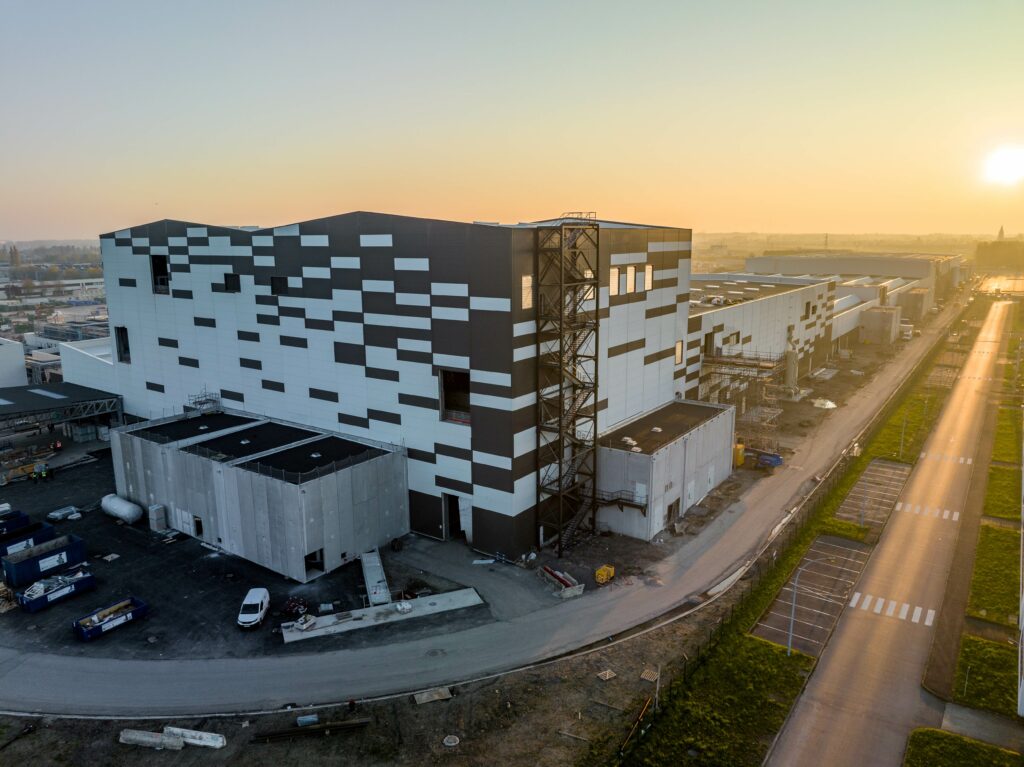The main building of the new battery cell production of the Automotive Cells Company (ACC) in Douvrin, a small town in the French department of Pas-de-Calais, is strikingly designed with a black-and-white pattern. Notable guests from the automotive and energy industries were present for the inauguration of the gigafactory on Tuesday. Among them were the CEOs of the involved companies, such as Ola Källenius from Mercedes, Carlos Tavares from Stellantis, and Patrick Pouyanné from Total Energies. The French government also sent high-ranking representatives. The German Federal Minister of Transport, Wissing (FDP), and the Industrial Minister Urso from Italy also participated in the event on Tuesday. The construction of the gigafactory is not just a symbolic act, but also has great significance for the region and the involved companies.
Europe’s Gigafactory Opening: A Milestone for Electric Mobility
The construction of ACC’s first gigafactory symbolically marks Europe’s efforts to break China’s dominant position in the production of electric car batteries and to become more independent in a crucial future technology. Ola Källenius described the factory as an “important milestone in Europe’s transformation” to make the automotive industry in Europe more resilient, competitive, and sustainable. The CEO of Mercedes stood on stage in the sparse factory hall along with the other chief executives. Battery production is set to begin later in the year.

Image: ACC
Källenius emphasized that this collaboration demonstrates the determination to keep the automotive industry in Europe in the era of electric mobility and to secure the continent’s economic future. The EU has decided to phase out internal combustion engines by 2035, with a few exceptions. Mercedes aims to produce only fully electric vehicles by the new decade. The Stellantis group, which emerged from the merger of Fiat Chrysler and the Peugeot Group, also has ambitious goals. The subsidiary Opel plans to stop offering vehicles with combustion engines in Europe from 2028 onwards.
Europe Aims to Catch Up: Investments in Gigafactories to Boost Battery Production
The competition from Chinese electric cars, which benefit from their market power in battery production, is already noticeable. According to data from the South Korean market research firm SNE Research, six of the top ten battery manufacturers worldwide are based in China. The other four companies in the top ten are based in South Korea and Japan. Europe still plays a minor role in the production of batteries, a key component for electric vehicles.
For the company ACC, the Douvrin location is the beginning of a larger plan. By 2025, additional gigafactories are to be built in Kaiserslautern, Germany, and in Termoli, Italy. The joint venture plans total investments of about seven billion euros, with Germany and France contributing 1.3 billion euros in government funding. The gigafactory in Douvrin will start with an initial production capacity of 13.4 gigawatt-hours per year and increase to 40 gigawatt-hours by the end of the decade. This corresponds to batteries for approximately 800,000 electric cars per year.
ACC Gigafactory: European Battery Production in Competition with Chinese Manufacturers
ACC was founded in 2020 as a joint venture between Stellantis and the battery manufacturer Saft, which is part of Total. Mercedes joined a year later. The joint goal of the company is to create a “European battery champion with global ambitions”. This includes not only supplying components for the electric models of Stellantis and Mercedes but also winning additional customers. However, Chinese industry giants like CATL and BYD also have high hopes to expand their sales in the growing global market for electric car drives. European car manufacturers will likely still be dependent on battery suppliers from Asia for a while.
By 2030, ACC aims for a production capacity of 120 gigawatt-hours, which equates to about two million electric car batteries per year. If Mercedes actually increases its share of pure electric cars to 100 percent by the end of the decade, the German conglomerate alone would require batteries with a total capacity of around 200 gigawatt-hours. This is why Mercedes also cooperates with the Chinese market leader CATL.
The inauguration of the gigafactory has particular significance for the French government. President Emmanuel Macron hopes to re-industrialize his country with green technologies and defend the European economy against competition from China and the US. In Douvrin, Economy Minister Bruno Le Maire said, “Europe needs to flex its muscles.”
Debate on protection against Chinese competition: Different positions on strengthening the European car industry in the field of electromobility
The region in the north-east of France where the ACC Gigafactory is located is to be developed into a centre for electric mobility in the EU, according to Paris’ plans. Near the Gigafactory is the Renault Centre for Electromobility, where a battery factory is also to be built. President Macron plans to reform the French purchase premium for electric cars in such a way that vehicles produced in China are effectively excluded from the subsidy.
At the opening of the gigafactory, Federal Transport Minister Wissing took a more reserved position and spoke out against protectionist measures. Joint projects like ACC are about reducing dependencies and ensuring that Europe remains “at the forefront of technological progress”.
By contrast, Stellantis boss Tavares seems to be more supportive of the French course. Asked whether European industry needed to be protected from electric cars from China, he replied: “It would be sensible to do that.”
